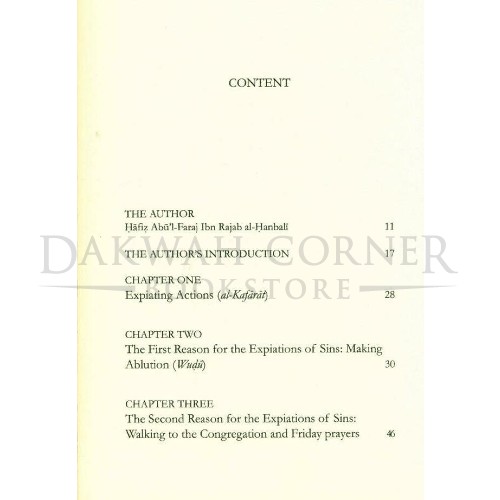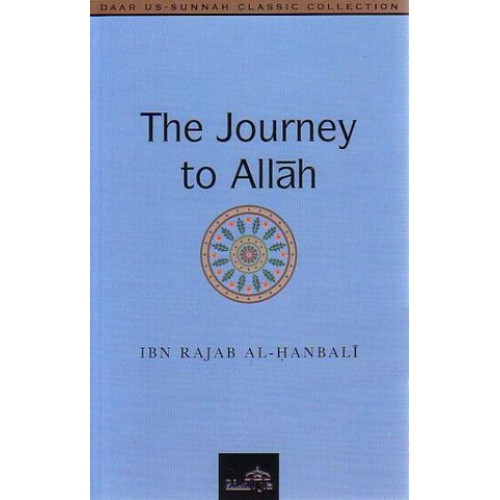Imam Abd Al-Rahman ibn Ahmad ibn Rajab (736-795 AH/1335–1393 CE), best known as Ibn Rajab Al-Hanbali and also Ibn Rajab
Difference Between Advising And Shaming ( Dar as-Sunnah)
[This book] beautifully illustrates the difference between advising that is encouraged and shaming that is not permitted.
Inheritors of The Prophets
In this eighth installment of the Ibn Rajab series, the illustrious Imam, may Allah have mercy upon him, penned a truly inspiring work highlighting the merits of knowledge, its types, and the role it plays in transforming an individual.
Legacy Of The Prophet (Dar Us Sunnah)
In this treatise, the author, ibn Rajab sets out to explain the advice the Prophet(s.a.w) imparted to ibn ‘Abbas (radiyAllahu ‘anhuma)…
On Remembering Death by Ibn Rajab Al-Hanbali
“Abdullah Ali’s faithful transaltion of a section concerning the meditation of death from Ibn Rajab’s famous work on yearly devotions is much needed in our culture of forgetfulness.
The Excellence of Knowledge (Dar as-Sunnah Publishers)
The way and wisdom of the Salaf, all goodness lies in traversing the way of the Salaf, beneficial Knowledge with regards the ‘Inner Sciences’, the foundation of knowledge and many other branches of the beneficial knowledge.
The Heavenly Dispute (Dar Us Sunnah)
The Prophet (peace and blessing be upon him) said of this hadith, “Indeed, it is the truth, so study and learn it.”
The Journey of the Strangers (P/B)
In this age of materialism, consumerism and extreme liberalism, the Muslim often finds himself at a loss, at odds to the ebb and flow of society, and holding of values, divinely revealed, that contrast starkly with the values held by many around him . He or she is looked at askance, accused of being backward, non-conformist and refusing to integrate. In the face of peer pressure, the resolve of some may weaken, the result being a watering-down of one’s adherence to Islam and the values it calls to.
The Prophet warned us that a time would come in which Islam and the Muslims would be beheld as strangers, not just by non-Muslims but by many Muslims as well! He informed us that days were coming in which trying to keep hold of one’s religion would be like holding red hot coals, and he stressed the paramount importance of holding fast to Islam in its pristine purity during that time, stating that this, and only this, was the path to success in this life and the next.
This book is a compilation of two tracts which explain the hadith, ”Islam began as something strange and it will return to being strange just as it began, sotuba for the strangers! ”It is hoped that it will be a source of comfort and inspiration for the Muslim who is striving to follow Islam at a time when the Muslim could well feel alienated and alone in the world. The first is a treatise penned by the great Imam, Al-Ajurri (d.330H), a scholar known for his deep knowledge and piety, his quality being recognised by all. The second is a monograph written by the Imam, Ibn Rajab Al-Hanbali (d.795H), a scholar praised extensively for his vast knowledge, ascetism and expertise in the Hanbali school of thought. An introduction has been added from the words of Shatibi and an appendix from ibn Al-Qayyim’s monumental Madarij al-Salikin.
The Journey to Allah (P/B)
Bukhari records on the authority of abu Hurayrah (raiyAllahu ?anhu) that the Prophet said, ?Your actions alone will not save any of you.? They asked, ?Messenger of Allah, not even you?? He replied, ?not even me, unless Allah were to envelop me in His mercy.
Be firm; steadfast and balanced; and journey [to Allah] in the beginning of the day, the end of the day, and a portion of the latter part of the night. Moderation, moderation! Through this you will attain your goal!?
He also recorded this hadith in another place with the wording, ?This religion is easy, none makes it hard upon himself except that it overwhelms him; therefore be firm, steadfast, and balanced; upon which have glad tidings! Seek help in this by journeying [to Allah] at the beginning of the day, at the end of the day, and a portion of the latter part of the night.?
He also records on the authority of ?A?ishah (raiyAllahu ?anhu) that the Prophet said, ?be firm, steadfast, and balanced upon which have glad tidings for indeed actions alone will not cause one to enter Paradise.? They asked, ?Messenger of allah, not even you?? He replied, ?not even me, unless Allah were to envelop me in His forgiveness and mercy.?
He also records on her authority that the Prophet said, ?be firm, steadfast, and balanced: know that your actions alone will not be a cause for your entry into Paradise and that the most beloved actions to allah are those that are done continuously and persistently, even if they be few.?
These noble ahadith detail a great and important principle from which stem many issues related to the journey to Allah while wayfaring along His Path.
Some of the Salaf said, ?The Hereafter consists either of allah?s forgiveness or the Fire; and this world is either a source of allah?s protection or a source of destruction.? On his deathbed, Muhammad ibn Wasi bid farewell to his companions saying, ?Peace be upon you, either to the Fire or to the forgiveness of allah.?
The Key To Paradise (P/B)
It was said to al-Hasan, ‘People say that whoever says, ‘None has the right to be worshipped,’ shall enter Paradise.’ He said, ‘Whoever says, ‘None has the right to be worshipped save Allah,’ and fulfils its obligations and meets its requirements, shall enter Paradise.’
Wahb ibn Munabbih was asked, ‘Is not the testification that ‘none has the right to be worshipped save Allah’ the key to Paradise?’ He replied, ‘Of course, but every key has its teeth; if you bring a key that has teeth, the door shall open; but if not, it will not.’
The Key to Paradise is the testification of Tawhid. This book highlights the importance of correct belief, a true love for Allah and the state of the heart.
Chapters Include:
The Manner of Entering Paradise
The Meaning of the Testification
Loving Allah
The Sound Heart
Also included is an extremely beneficial appendix – The Types of Hearts by al-Hafiz ibn Qayyim al-Jawziyyah.
























